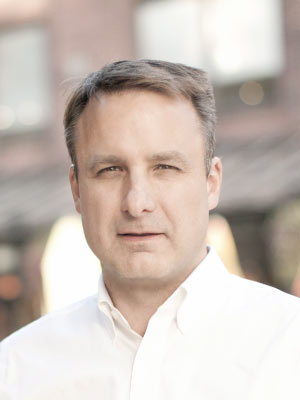
Even after 16 years away from the University of Wisconsin–Madison, Jonathan Foley can’t quite shake the lasting impact the university has had on him. Starting as a student and ending as a professor, Foley remembers his time at UW–Madison as being remarkable and exemplary. “Madison is a very special place. It can compete with the Harvards and Stanfords of the world any day of the week on the things that really matter,” Foley said. “And the students come well prepared. They’re super smart and have a dedication to service.”
While Foley’s career started at UW–Madison, he has gone on to advance the university’s mission throughout the country — including developing the University of Minnesota’s Institute on the Environment, running a science museum in San Francisco, and heading up a climate solutions nonprofit. Foley attests his prolific career to his time spent at UW–Madison, but his start in life can be found in a completely different part of the country.
Growing up in a small town in Maine, Foley spent his childhood plucking around tide pools, roaming the northern woods, and gazing up at the stars on a clear night. “I think a lot of people who find themselves in environmental work have had a deep connection to the outdoors and the environment since childhood,” Foley said. His love of the outdoors was matched by his enthusiasm for science and figuring out how things worked.
These passions led him to UW–Madison where he originally majored in astronomy and physics, as he was fascinated at how other planets worked. Foley enrolled in a few meteorology courses to help him with his studies after he had the opportunity to analyze early photos of Jupiter’s cloud patterns taken by Voyager 2. Met with an exceptional atmospheric science department, Foley realized that the other planets in the universe would be fine, but ours was the one that was in trouble. “It finally dawned on me that I could connect my interest in science with my interest in the environment and do something more practical by turning that telescope in the other direction,” Foley said.
Foley went on to earn his PhD in atmospheric sciences from UW–Madison where he worked on building sophisticated climate models that simulated the future of our planet inside of a computer. He focused on adding biological elements of the planet into the climate models and worked out how the atmosphere and life on Earth would interact together in the future. Once finished with his PhD, Foley accepted a professorship with the university, splitting time between the Nelson Institute and the Department of Atmospheric and Oceanic Sciences.
“Madison was a wonderful place to work because there were not only great meteorologists, oceanographers, and climate scientists, but there was also many of the best ecologists, foresters, soil scientists, and every possible discipline you can think of at Madison,” Foley said. “I was like a kid in a candy store.”
During his 15 years of teaching at UW–Madison, Foley launched the Climate, People, and Environment Program (CPEP), founded the Center for Sustainability and the Global Environment (SAGE), and served as the first Gaylord Nelson Distinguished Professor of Environmental Studies. His role in developing CPEP and SAGE with the Nelson Institute has created a cascading effect of environmental and sustainability advancement across campus and the wider community as the programs brought on additional faculty, including Greg Nemet, Tracy Holloway, and Jonathan Patz, among many others. “It’s a legacy that I think is in the spirit of the Nelson Institute — doing great environmental scholarly work, but also making sure it connects to the real world and does some good,” Foley said.
Foley left UW–Madison to start the University of Minnesota’s Institute on the Environment, using what he learned at the Nelson Institute to establish an even broader reach for environmental impact. After six years there and making sure the program was steady on its feet, he left to become the CEO of the California Academy of Sciences located in San Francisco’s Golden Gate Park. Foley moved to the West Coast to help the academy — which is also a planetarium, aquarium, and natural history museum — pivot from talking about the Earth’s past to motivating discussions about the sustainability of life into the future. “Including topics like climate change, food systems, biodiversity, water, and all the big sustainability challenges that our planet faces,” Foley said.
After five years with the museum, Foley wanted to get back to doing more hands-on work and was approached to spearhead Project Drawdown, a climate solutions nonprofit that started from the bestselling book Drawdown. The book outlines a series of different solutions to climate change, which the nonprofit furthers by being the world’s leading resource to guide climate solutions and strategies. Foley now works with businesses, governments, communities, investors, philanthropists, and other nonprofits all over the world on finding the most effective sustainability solutions for them.
With a wealth of knowledge and experience from his career, Foley emphasizes that every person in every career can work to address climate change. “We desperately need everyone. We need a lot more diversity, community, and different disciplines,” Foley said. “And that’s where the Nelson Institute is so critical because it gives students depth in one area while developing a breadth of connection and communication in those other fields.”
Meet John Foley during Earth Fest
Achieving Drawdown: A Hopeful, Science-Based Plan to Address Climate Change
Thursday, April 25 | 4:15–5:15 p.m.
Learn more